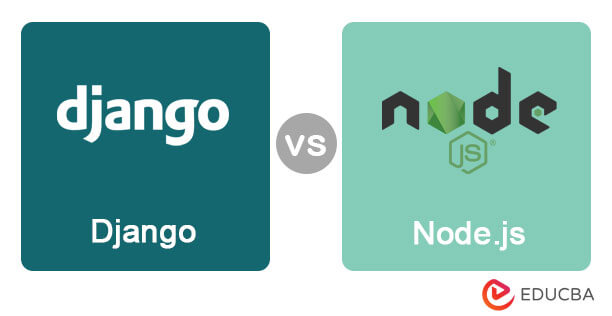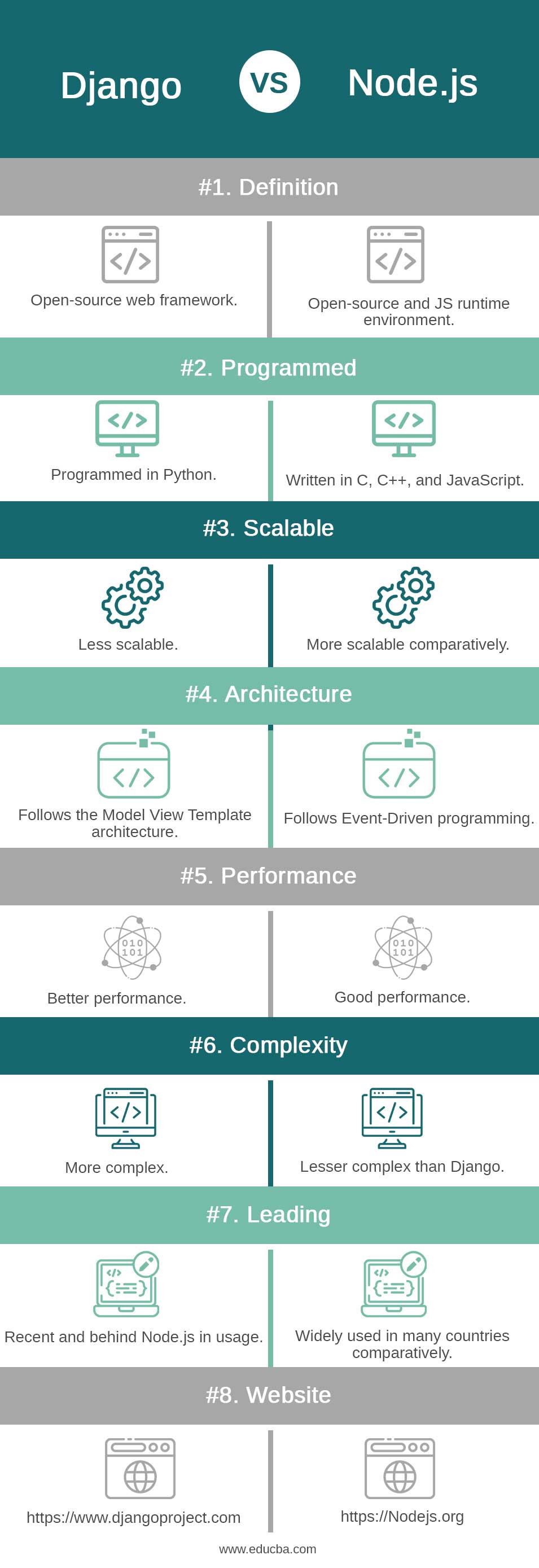Updated May 22, 2023

Differences Between Django vs Node.js
Django is a Python-based open-source web framework. It follows the ‘Don’t repeat yourself’ (DRY) principle and is one of the top Python frameworks for developing web applications and websites due to its great features and advantages. Node.js is an open-source JavaScript runtime environment. It is widely used for operating systems like Linux, Windows, MacOS, etc. Node.js helps develop high-level network applications using server-side JavaScript. The rest of the article analyzes the differences between Django and Node.js in detail.
Django
- Django was developed by the Django Software Foundation in 2005 and designed by Adrian Holovaty and Simon Willison. The primary feature of Django is its high-level Python web framework, which provides the best way to design applications. Since developers need to follow the rules or guidelines for implementing projects in Django, there is less freedom compared to low-level frameworks. However, the applications created with Django are neat and clean.
- Django mainly follows the Model-View-Template (MVT) design pattern, which is similar to the Model-View-Controller (MVC) framework with the addition of a template layer. In MVT, the data access layer is in the Model, which handles interacting with and validating the data. The Template layer is the presentation layer that determines what should be displayed on the web page or application. The View layer serves as the business layer, accessing the Models directly and indicating the appropriate templates. The View layer works as a bridge between the Model and the Template.
- Django is a free and open-source web framework available for various operating systems. It encourages rapid development and is suitable for quickly getting things up and running. Django uses a unique concept of “apps,” meaning that every project or web application can have multiple applications. Django allows you to move apps from one task to another quickly.
Node.js
- Node.js, developed by Joyent and designed by Ryan Dahl, was first released in 2009. It was written in C, C++, and JavaScript and built on the Google V8 JavaScript engine. Node.js functions like a web server, allowing developers to write complete and highly scalable web applications using JavaScript. There are thousands of open-source libraries to support Node.js.
- Node.js has many features, including an event-driven model, concurrency, simplicity, lightweight design, and non-blocking input-output. In the event-driven Model, Node.js spawns only one operating system thread on the server machine and maintains a small heap request. This event is called a connection being established, a transaction being processed, receiving data from the link, and a connection closure. A callback function is associated with these events so that the function is fired as soon as any event gets completed.
- Node.js demonstrates that it offers maximum concurrency and scalability. It is lightweight and the simplest among all scripting languages owing to its JavaScript. Non-blocking input-output is a feature of Node.js that enables web servers to receive and respond to requests without waiting for input or output, making it even more scalable.
Head to Head Comparison of Django vs Node.js (Infographics)
Below are the 8 primary comparisons between Django vs Node.js.
Django vs Node.js: Key Differences
Below are some key points highlighting the differences between Django and Node.js:
- Django provides excellent security, and developers do not need to worry about security concerns while developing applications. Node.js also provides good protection, but developers need to ensure it themselves.
- Django is versatile and has used content management, computing platforms, and extensive web application development. Node.js is suitable for a wide range of JavaScript web applications and provides developers with the freedom and space to develop applications from scratch.
- While Django is not mainly referred to as a full-stack web development framework, Node.js is becoming popular, making full-stack JavaScript a reality that allows developers to write code for backend and front-end applications.
- Django has a smaller community for support, while Node.js has an active community that helps programmers improve themselves, provides solutions, and improves the framework.
- Django makes development more efficient and cost-effective, while Node.js makes products easy but may slow down the process.
- Learning Django is easy if developers know Python; otherwise, learning can be complex. Node.js is easy to learn if individuals know JavaScript.
- Django has many features that enrich this framework for developers, like content development, sitemaps, and user authentication. Node.js also has excellent features like non-blocking input-output.
- Django web application development is stable, while the Node.js system may lack stability.
- While Django has a great learning curve, Node.js is simple and easy to learn.
- Django is mainly used for large applications and supports multi-threaded programming. Node.js does not support multi-threaded programming and is not ideal for running extensive calculations.
Django and Node.js Comparison Table
Below are the points lists; describe the comparisons Between Django and Node.js.
| Basis of Comparison | Django | Node.js |
| Definition | Open-source web framework | Open-source and JS runtime environment |
| Programmed | Programmed in Python | Written in C, C++, and JavaScript |
| Scalable | Less scalable | More scalable comparatively |
| Architecture | Follows the Model View Template architecture | Follows Event-Driven programming |
| Performance | Better performance | Good performance |
| Complexity | More complex | Lesser complex than Django |
| Leading | Recent and behind Node.js in usage | Widely used in many countries, comparatively |
| Website | https://www.djangoproject.com | https://Nodejs.org |
Conclusion
Django and Node.js are two different languages used for web application development. For web developers, Python, Django, JavaScript, and Node.js are some of the top choices for development. From a developer’s perspective, iupgradingtheir skills and existing knowledge. is always necessary It is good to learn different techniques while working on one technology for a long time, as it helps to improve flexibility and keep up with the demands of technology in the IT world.
Recommended Articles
We hope that this EDUCBA information on “Django vs Node.js” was beneficial to you. You can view EDUCBA’s recommended articles for more information.

